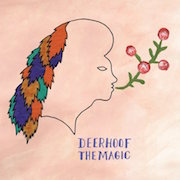“Always different, always the same,” said John Peel of The Fall, and in time this quote has entered the lexicon enough for Google autocomplete to fill in the rest when one types the first two words. It’s easy to understand, despite having the air of a backhanded compliment, and easily adaptable; mostly, though, it gets used to describe alternative rock bands who are uncommercial, venerable and possess a steady workrate, like The Fall. And like tireless American postpunk reshapers Deerhoof, whose thirteenth album The Magic is their best since, oh, one that was released long enough ago to telegraph that these guys still sound vital and you should definitely carry on reading this review.
Or, to put it another way: Deerhoof have been releasing records for over twenty years, emerging from the fringes of San Francisco’s punk rock scene but harbouring musical tastes and horizons way beyond that. Even with lineup changes along the way, the four-piece are a telepathically well-drilled unit who surely know each other’s playing better than most rock musicians know their own. They’ve appropriated enough styles, and switched between extremes of sugar-sweet and rudely abrasive, that even fans are unlikely to love everything they release… but Deerhoof just don’t do obvious, objective clunkers.
You might clock a song from The Magic like ‘That Ain’t No Life To Me’ – a first wave punk rock basher sung by guitarist Ed Rodriguez, curiously herberty and quite un-Deerhoof-like – and pine for more of the approachable, fractured pop of their last album, 2014’s La Isla Bonita. They’re dab hands at it, though. In any case, it’s followed up by ‘Life Is Suffering’, which despite its crust metal-esque title is rather buoyant, like some late 60s bedroom psych side filtered through This Heat and Talking Heads alike. (Similarly, ‘Dispossessor’ – this album’s other punker turn, lifted by a splendid solo that emboldens the ‘power’ in powerpop – is succeeded by ‘I Don’t Want To Set The World On Fire’, a brief cover of an Ink Spots song in which the band’s most regular singer, Satomi Matsuzaki, croons falteringly over a wobbly karaoke machine backing.)
The component parts of The Magic have no rational right to appear on a single-artist album. Right from the start, ‘The Devil And His Anarchic Surrealist Retinue’ proffers rusty garage rock guitars with one hand; with the other, squealy synthesiser parts that sound ripped from some unknown 1980s boogie twelve-inch. For a release spoken in some quarters as Deerhoof’s back-to-basics rock effort, the synths frequently gleam front and centre. The blocky melody that fuels ‘Criminals Of The Dream’ would have passed muster as theme music to an old BBC children’s education programme (I suspect I’m thinking of Words And Pictures, should you be the right age and wish to attempt empty nostalgia with me). ‘Learning To Apologize Efectively’ has neat Brainiac-recalling synthpunk parts, but also a profound sense of melancholy by Matsuzaki’s vocal approach. And the group’s inbuilt awkwardness can’t nullify the pop gloss of ‘Acceptance Speech’, whose ancestry may lie in Tears For Fears and/or MTV pop-metal of that same three-decades-past period. (Folks who preordered this LP were thanked with a free cassette of cover versions, including Deerhoof’s loving desecration of ‘Pour Some Sugar On Me’ by Def Leppard.)
While it’s palpably untrue that if you’ve heard one Deerhoof album you’ve heard them all, they pretty much always sound like themselves, even while trying to confound expectations. The Magic has at least one song (‘Debut’) that is probably the sort of Deerhoof song that people who hate Deerhoof hate, as well as ‘Little Hollywood’, in which almost every element of this album previously paraded gets shoehorned into three typically restless minutes. Fifteen songs is probably a few too many, but it’s hard to imagine consensus among listeners on what to excise, and plausibly the band ran into the same problem. If so, they’ve earned the right to moderate self-indulgence at this point.


